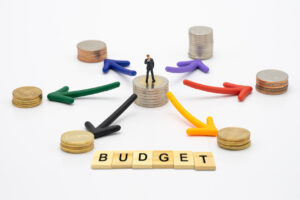Budgeting with SMART techniques is an invaluable way to manage and track finances effectively, enabling individuals to create plans that are measurable, achievable, and relevant to meeting personal goals. At first, add up all of your income sources, such as salaries and side jobs, investments, or rental payments. After this step is completed, calculate all expenses.
1. I Want to Spend Less
Budgeting can be an invaluable asset in an instant gratification culture; budgeting allows individuals and entities to effectively control their spending habits and make wiser financial decisions over time. Budgets encourage individuals to live within their means while simultaneously decreasing financial stress levels and prioritizing investments that build wealth over time.
One way to reduce spending is by eliminating unnecessary expenses like subscription services and impulse buys. Another method for cutting expenses is making all purchases with cash instead of credit or debit, forcing yourself to be more aware of where every penny goes. Make sure that a portion of your budget goes toward debt repayment or savings goals, such as eliminating interest charges while creating momentum over time.
2. I Want to Save More
Saving money should be at the center of every budget, and automatic savings plans and cutting spending in areas where you overspend can lead to real savings. One effective strategy to increase savings is dividing expenses between needs and wants. A “need” includes expenses essential to daily life, such as housing or food costs, while “wants” could include discretionary items such as movie tickets or monthly music subscriptions.
By comparing your income and expenses, you can easily ascertain how much savings is necessary to meet both short-term and long-term financial goals. When setting goals that will lead to long-term success, always remember the acronym SMART—specific, measurable, actionable, realistic, and time-bound goals are best.
3. I Want to Invest
Budgeting, saving, investing, and spending responsibly all require careful management of finances. Adopting a SMART approach to budgeting helps your finances flourish over time. Start by tracking your expenses and identifying any wasteful spending, like those mindless Amazon purchases or subscriptions you never use. Establish objectives for yourself and acknowledge your accomplishments.
Adopting the habit of paying yourself first, paying down debt, and investing can significantly increase savings. Ent offers free tools and apps to make this easier for you, such as setting reminders on your phone or computer to remind you to pay bills or save.
4. I Want to Build Wealth
Budgeting can help you achieve long-term financial goals like home ownership or retirement with ease. A good budgeting strategy allows you to develop better spending habits, control impulsive purchases, and put aside enough funds for short-term needs.
Ideal budgeting involves tracking expenses for at least a month and cutting unnecessary costs. Additionally, this form of budgeting will help manage debt repayment while prioritizing savings—keeping emergency funds and keeping an eye on debt repayment will allow you to build wealth more slowly over time by decreasing reliance on credit cards or loans.
5. I Want to Create Financial Freedom
Financial freedom requires careful planning and consistent efforts. Implementing strategies such as budgeting, paying down debt, and investing can help you reach your goal more quickly. Establishing an effective budget requires distinguishing between needs and wants. A need is something essential, like shelter or food, while wants are items you would enjoy but that are not essential—for instance, a music subscription might fall under this category, while monthly transportation expenses do not.
By prioritizing, spending less, and avoiding high-interest debt, you can move closer to financial freedom. Protect yourself further with income protection, life, and trauma insurance—these measures may provide long-term peace of mind and give your finances the attention they deserve.
6. I Want to Be in Control of My Money
Budgets are essential tools for effectively managing finances, helping you identify how much money comes in each month and where it goes. A budget also allows you to save for things you desire while paying for necessities such as rent, food, and transportation costs.
Begin by keeping track of every penny spent, whether that be via spreadsheet, notebook, or budgeting app. Doing this will give an accurate picture of where your money is going and enable you to make better choices in the future based on this knowledge. Delayed gratification plays a critical role in wealth accumulation and financial freedom—using this approach is key!
7. I Want to Have a Plan for the Future
Budgeting can help you reach your financial goals more quickly and easily. Start by tallying up your income and subtracting out expenses; then set SMART goals (Specific, Measurable, Achievable, Relevant, and Time-Based). These will keep you on the right path towards reaching them.
Budgeting tools and worksheets often come equipped with features designed to assist with this, but if you use one, be sure to customize it to meet your individual needs. For instance, if your goal is building wealth rather than simply managing expenses based on wants vs. needs, you might try creating a “Yes Fund” with no spending restrictions to allow for exciting investments or purchases that give gratifying returns on investments or purchases.
8. I Want to Stay in Control of My Spending
Integrating a budget into your finances is a great way to stay on track with spending and discover ways to save more and invest for the future.
Track your spending daily to identify negative spending habits that are costing you money, and start making changes immediately. Establish a regular tracking habit to quickly identify negative trends and implement necessary changes. Make use of an app or calendar to monitor expenses. Starting an emergency savings account could help, then divert some funds from other categories into it.
9. I Want to Have a Plan for the Future
Budgeting is key to financial success. By allocating 50% of your monthly income for essentials, 30% for wants, and 20% towards savings/debt repayment, you can create financial stability and ensure long-term security. An example budget system would be the 50/30/20 rule: allocate 50% of income for essentials, 30% for wants, and 20% for savings/debt repayment.
While a budget can help manage spending, it may not be enough to achieve your financial goals. Try these effective budgeting strategies and apps to get on the right path.




